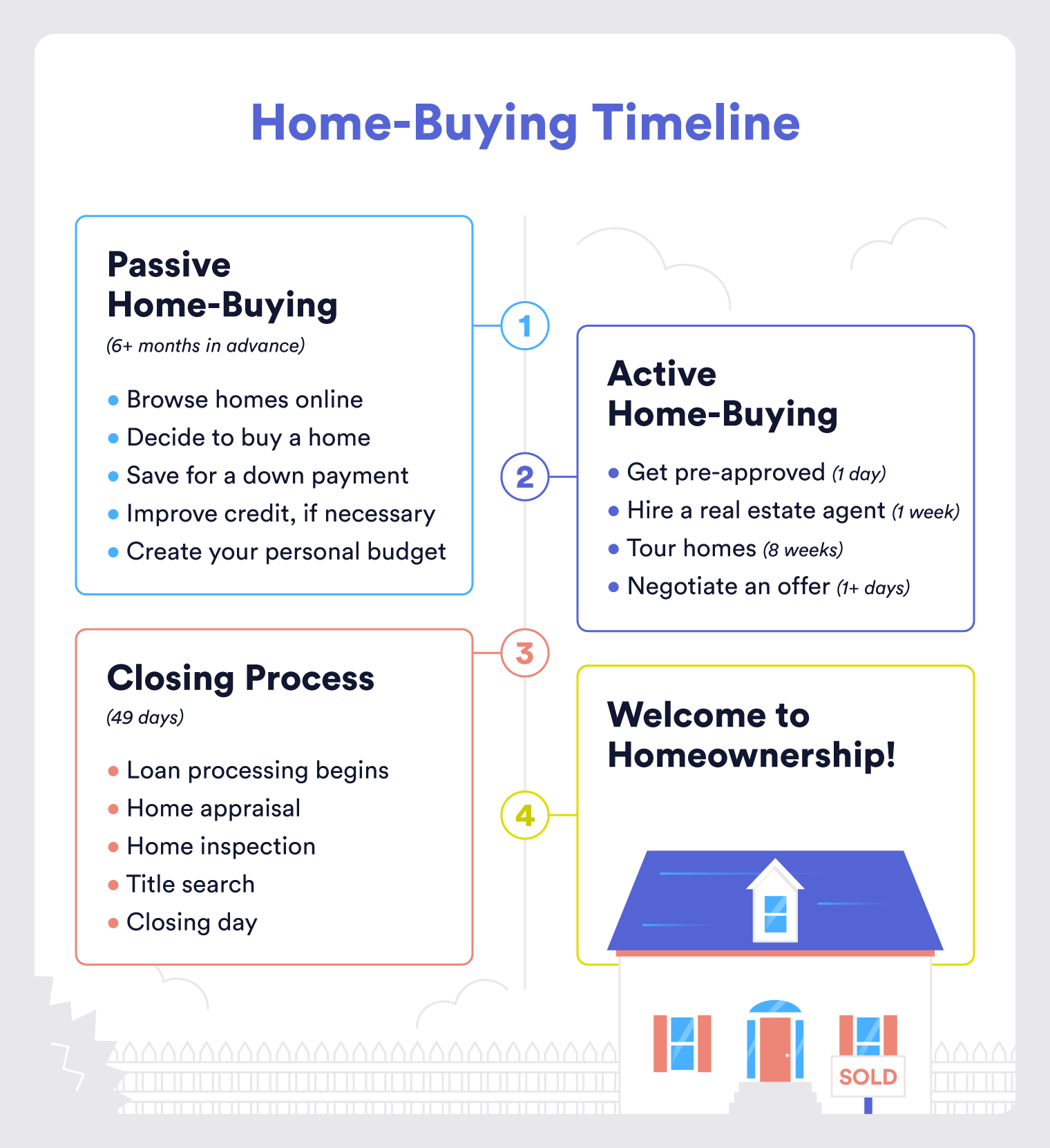Many dream of owning a home, but the path to homeownership can seem overwhelming. If you're a first-time buyer, understanding the home-buying timeline is essential to navigate the process smoothly. In this article, we'll break down the journey into simple steps, providing you with valuable insights and tips to help you along the way.
How Long Does It Take to Buy a House?
The time it takes to buy a house can vary from 15 weeks to eight months. It all depends on various factors, such as finding the right home, getting pre-approved for a mortgage, and completing the necessary paperwork. On average, it takes about four months to move into a new home. However, keep in mind that these timelines are estimates and can vary for each individual situation.
 Fig. 1: The Typical Timeline For A First-Time Home Buyer (Although You May Move Faster Or Slower Than This Illustration)
Fig. 1: The Typical Timeline For A First-Time Home Buyer (Although You May Move Faster Or Slower Than This Illustration)
1. Begin Planning to Buy a Home
To start your home-buying journey, you need to determine your homeownership goals. Consider factors such as the size of your future home, the need for a backyard, or the desire to invest in property. Understanding your goals will help you decide what type of home you want and when you plan to move.
This is also an excellent time to evaluate your finances and build a monthly budget. A well-defined budget will not only help you determine how much you can afford for a mortgage payment but also set savings goals for your down payment and closing costs. Additionally, explore down payment assistance options and accessible loan types if you have concerns about your current financial situation. Lastly, getting pre-approved for a mortgage will give you a clear home-buying budget.
2. Choose a Mortgage Lender
When it comes to selecting a mortgage lender, take the time to research and find one that suits your needs. A mortgage lender will guide you through the loan process, help you choose the right loan type, and provide advice on down payment options. Most first-time homebuyers opt for a conventional 30-year mortgage, as it offers lower monthly payments. However, government-backed loans, such as FHA, USDA, and VA loans, are also worth considering, depending on your eligibility.
3. Get a Mortgage Pre-Approval
A mortgage pre-approval is an essential step before you start searching for your dream home. It provides you with an idea of how much you can afford and demonstrates to sellers that you are a serious buyer. Aim to get pre-approved before you begin house hunting, as this will give you a competitive edge in a competitive market. Keep in mind that pre-approvals typically expire after 90 days and may need to be refreshed if you don't find a suitable home within that time frame.
4. Hire a Real Estate Agent
Finding the right real estate agent is crucial to your home-buying success. A buyer's agent will help you navigate the market, find suitable homes, negotiate with sellers, and guide you through the entire process. To find a reputable agent, consider recommendations from your mortgage lender, family, and friends. Avoid using the listing agent, as this can lead to a conflict of interest. Take the time to build a home-buying team that understands your needs and can provide you with the necessary guidance.
 Fig. 2: 89% Of Home Buyers Purchased Their Home With The Help Of A Real Estate Agent (Source: NAR)
Fig. 2: 89% Of Home Buyers Purchased Their Home With The Help Of A Real Estate Agent (Source: NAR)
5. Shop for Your New Home
Now comes the exciting part - house hunting! Take the time to define your preferences and create a list of must-haves, nice-to-haves, and deal-breakers. This will help you and your real estate agent narrow down the properties that align with your needs. While touring potential homes, keep an open mind and use the experience to refine your vision of your dream home.
6. Make an Offer
Once you find a home you love, your real estate agent will guide you through the process of making an offer. Prepare an offer letter that includes important details such as the purchase price, down payment, contingencies, and desired closing dates. Remember, real estate laws vary by location, so ensure your offer complies with local regulations. Stay open to negotiations with the seller to reach a mutually beneficial agreement.
7. Loan Processing and Underwriting
After your offer is accepted, the loan processing and underwriting phase begins. Loan processors will review your mortgage application to ensure all necessary information is included. The underwriter will verify your credit score, credit report, and property details. This process may raise questions or require additional documentation from you. During this phase, you will also need to arrange for a home appraisal, inspection, and title search.
Home Appraisal
A home appraisal is conducted to determine the value of the property. It is essential for securing a mortgage as lenders want to ensure they are lending an appropriate amount for the home. An appraiser will assess the property's features, amenities, and comparable sales in the area. If the appraisal value aligns with the sale price, the process proceeds smoothly. However, if the appraisal comes in lower, negotiations may be necessary.
Home Inspection
While not mandatory, a home inspection is highly recommended. A professional inspector will evaluate the home's condition and identify any potential issues. This information will help you make an informed decision about the purchase and may provide negotiating leverage if repairs are needed. Remember, you have the right to walk away from the purchase or renegotiate terms based on the inspection report.
Title Search
A title search ensures that the property's ownership is clear and transferable. This step is crucial to protect your future ownership rights and identify any potential issues, such as liens or disputes. The title company will conduct a thorough investigation and provide you with a title report that confirms the legitimacy of the property's ownership.
8. Close on Your New Home
After completing all the necessary steps, the exciting day of closing arrives. Review the closing disclosure to verify the loan's terms and costs. Perform a final walk-through of the property to ensure everything is in order. On closing day, you and the seller will sign the final paperwork, exchange funds, and receive the keys to your new home. Congratulations, you are now a proud homeowner!
 Fig. 3: Homebuying Timeline - Welcome To Homeownership
Fig. 3: Homebuying Timeline - Welcome To Homeownership
Remember, the journey to homeownership is unique for each individual, and these timelines are estimates. By understanding the home-buying timeline and following these steps, you can confidently navigate the process and make your dream of owning a home a reality. Happy house hunting!









